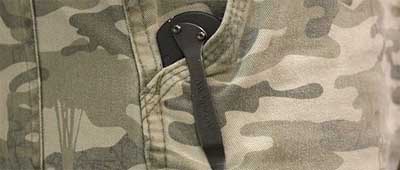Things To Keep On You For Emergency
The most useful survival tool is the one that you have with you when you need to survive.
So, having said that, what do you have with you, right now, on your person?
Or, what should you have on you, right now?
We often talk about the preps and supplies that we should have in storage or in kits, to be prepared for disaster or collapse; but the thing is, these supplies are stored at home or a bag, or vehicle, or somewhere that is not on your person (which is fine). Have you ever asked yourself what are the things that you might keep in your pockets, or somewhere on your person habitually at all times without being laden down with gear?
The answer to this is just as varied as that of any survival kit, and for many of the same reasons. No two answers will be the same. However there are some common sense thought processes which will help you determine what some of those items might be…
What is the use case scenario? Are the items geared towards ordinary every-day emergencies? Or worse? Are they geared toward life circumstances as you live it today? Your place at work and your typical daily travels? Is it geared toward a camping or hiking trip? A specific trip? A bug-out scenario? Your local region and geographical/climatic extremes? More? Less?
As an example, during my previous career and during the times that I would travel for work, I would consciously bring more ‘things’ with me for situations ‘just in case’. When I would travel internationally, I would bring even more ‘things’. The further away that I would be from my home base, the more I would think about ‘what-if’ scenarios and how I would get back home or survive on my own for a time…
While the odds seemed low of anything drastic happening while I was out traveling, the fact is that you never know… After 9/11 happened, I realized that you could potentially be stranded thousands of miles from home. Some of my work-mates were stuck in this scenario for awhile during that time.
Even if you are just at work during the day, or out shopping somewhere, how do you know that a disaster won’t happen which will send your life into chaos, and provide challenges to make your way home.
Here is a short list of items that may be helpful to keep on your person, and a starting point to get you to think of your own preferences and uses.
CASH. Cash money will get you out of many a jam, even for a time following a SHTF disaster. Having cash on hand is more tangible than a credit card or debit card. Do not short change yourself here. $20 or $50 is not enough. The further away from home you are, the more cash you will potentially need. Keeping nothing larger than 20’s. A mixture of smalls is best.
How much is enough? You tell me… think about your own hypothetical situations and your own extent of travel. Just pretend that you are away at the extent of your likely travels and then imagine that the only form of currency accepted will be cash. How much of a cushion do you want to keep with you?
Sure… if we’re talking about a terrible SHTF collapse, cash will become worthless after everyone realizes it. But this will take a bit of a while. So for ordinary daily carry, do not discount the benefit of having enough with you all the time.
CREDIT CARD. Even though I just insinuated that cash is king, the truth is that during ordinary times, having a credit card is essential for some emergency scenarios. There are many things that you simply cannot do without one, like renting a car or reserving a hotel room… which I believe may be the most legitimate emergency uses of having a credit card.
POCKET KNIFE. I won’t go into the multitude of uses for a pocket knife, since they are mostly obvious.
CELL PHONE. Quick communication is often key to a successful survival plan. Be the first to make that airline, hotel, or auto rental reservation before the hoards take to the airwaves after they realize their predicament in a disaster. During a disaster, ‘texting’ rather than voice calling, will almost always work – as long as the cell towers are running. The ability to dial 911 is also an obvious emergency benefit.
LIGHTER. Or matches, or any tool enabling the ability to make fire.
FLASHLIGHT. A small LED flashlight hardly takes up any room at all, and can even be attached to your keychain.
BANDANA. Either worn on your head or kept in your pocket, a cloth bandana has a thousand uses.
PARACORD. A paracord bracelet or necklace (both of which will unravel into a useable length), or a small coiled up length in one’s pocket, also has a thousand practical uses.
WEAPON. Where it is legal, carry the appropriate ‘tool’ that you are comfortable with. Improvise where able.
When traveling far from home (a business trip or distant vacation?), consider taking more with you, or building a small ‘kit’ that might fit in a ‘fanny pack’ of sorts.
Add items like the Mylar emergency blanket(s), LED headlamp, compass, pocket Atlas, first-aid, magnesium fire-starter, water purification tablets, potassium iodide pills, calorie food bars, an ounce (or more?) of gold (and/or silver) to buy or bribe transportation heading towards home, a pen and small notebook, small can-opener (P-38 or P-51?), sewing kit including heavier needle, small backpack, metal water container, ?
What you carry every day depends on so many things (how many pockets do you have?) and I’m curious what others carry with them as you go about your daily lives…

